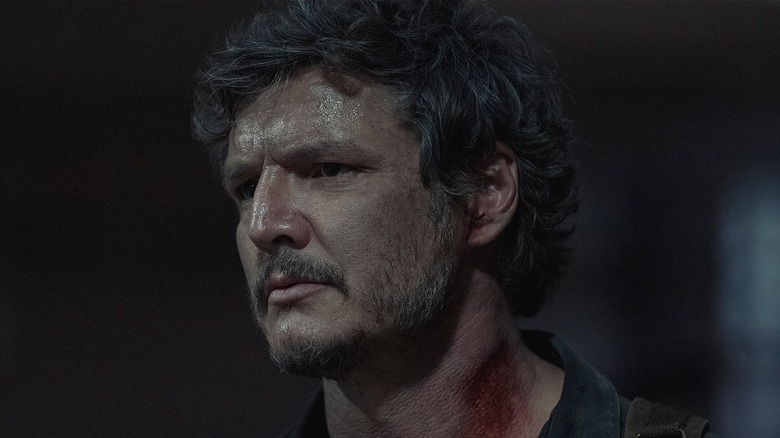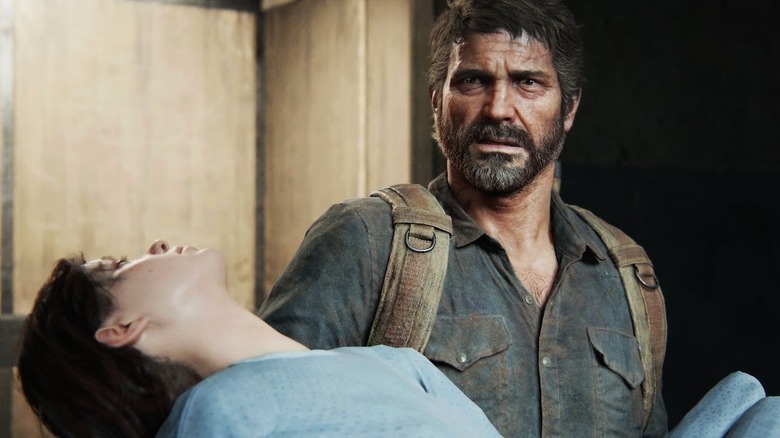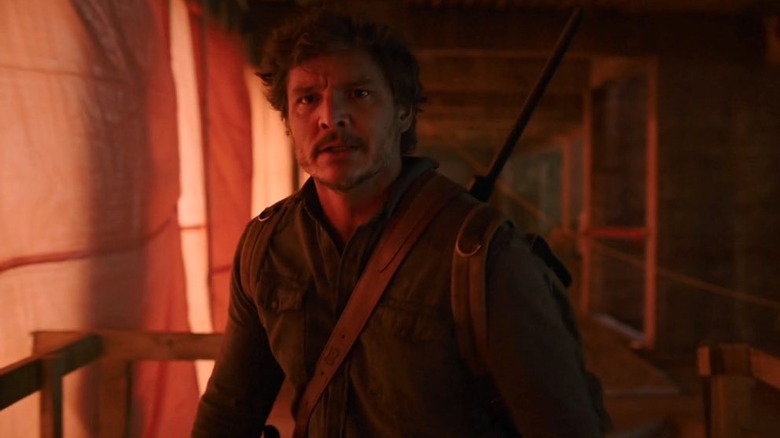The Last Of Us: Why Joel's Finale Decision Hits Harder On TV
Spoilers ahead for "The Last of Us" games and HBO series.
The season finale of HBO's "The Last of Us" was always going to be a controversial affair. Even a decade after the release of the first game in the franchise, players are still debating whether or not Joel was in the right. Upon learning that Ellie would have to die in order for the Fireflies to possibly synthesize a cure for the Cordyceps pandemic, Joel goes on a rampage through the militia's hospital facility, killing everyone who stands in his way and leaving with Ellie. He essentially dooms the world to save his newfound daughter figure.
If you've played the games, you know the sequence is coming. As a gamer, you know what kind of violence Joel is capable of — after all, you've controlled his actions for hours — and yet, you may still find yourself taken aback by the savagery on display. Even aside from the moral implications of removing the possibility of a cure, Joel's merciless attack may leave viewers feeling queasy, even if they already know how the story ends.
Why is that?
The separation between a player and a viewer
Simply put, the relationship between a gamer and their playable character is different from the one that exists between a viewer and a television character. When battling your way through a tomb in "Uncharted," it's easy to forget that Nathan Drake is killing hundreds of human beings in his search for treasure. You just sort of go with it, because "Uncharted" is an action video game and characters in action video games shoot people. That is their function. It's also probably why Nathan Drake doesn't commit quite as much murder in the "Uncharted" movie — that's not really what we expect from our fresh-faced popcorn movie heroes (Iron Man's infamous snap aside).
As the writing in video games has evolved over the years, the problem of ludonarrative dissonance has become more apparent. Players are occasionally asked to put aside their own moral quandaries, as well as how they perceive the character they're controlling, in order to play the game the way it has been designed, regardless of the human toll. Think about the contrast between the fun-loving, wise-cracking Nathan Drake of the cutscenes and the murder machine seen in those games' combat encounters.
It's the same way with "The Last of Us." Joel Miller is arguably a much more layered and interesting character than Nathan Drake, and we know that his guiding light is a desire to protect Ellie and prevent feeling like he failed her in the same way he failed his daughter. Even so, he is ultimately an action game protagonist. He has to blast and stab his way through the Fireflies' hospital or the game doesn't have an ending, right?
The thing is, there's a difference between guiding Joel through the last combat encounter in the game and seeing a cold-blooded execution play out on television.
How HBO's The Last of Us handles the final battle
Holding the controller can change everything. With all of the bullets whizzing about — and players no doubt failing the intense final section of the game a few times — it's easy to fall into a "kill or be killed" mentality as Joel fights his way through the hospital. You might even understand his savagery in the moment. You may not agree with Joel's decision, but it feels like you have to see the story through, so you keep fighting and quickly step over your fallen enemies.
The television adaptation feels different, though, and it's purposefully shot and edited in a way that leaves no doubt that Joel is doing a terrible thing here. Joel cuts down soldiers as they are laying down their weapons and surrendering, or else running away in fear. The camera lingers on their brutalized bodies for several seconds at a time, mournful music underscoring every bit of it. These people were more than just aggressive NPCs, and the transition from virtual characters to live-action makes that abundantly clear. Here, there is no player agency, no sense that the viewer can enact any kind of mercy. This isn't a victory, it's a slaughter, and the episode makes sure you understand that implicitly.
As the credits roll on the first season of the TV series, you may find yourself hating Joel, or even feeling like he's the true villain of the series. The show, perhaps even more than the video games, has made it very clear that Joel is not someone to envy. He's done terrible things to survive, and he'll keep doing them. There are no easy answers in the world of "The Last of Us," and this finale is a stark reminder of that.



